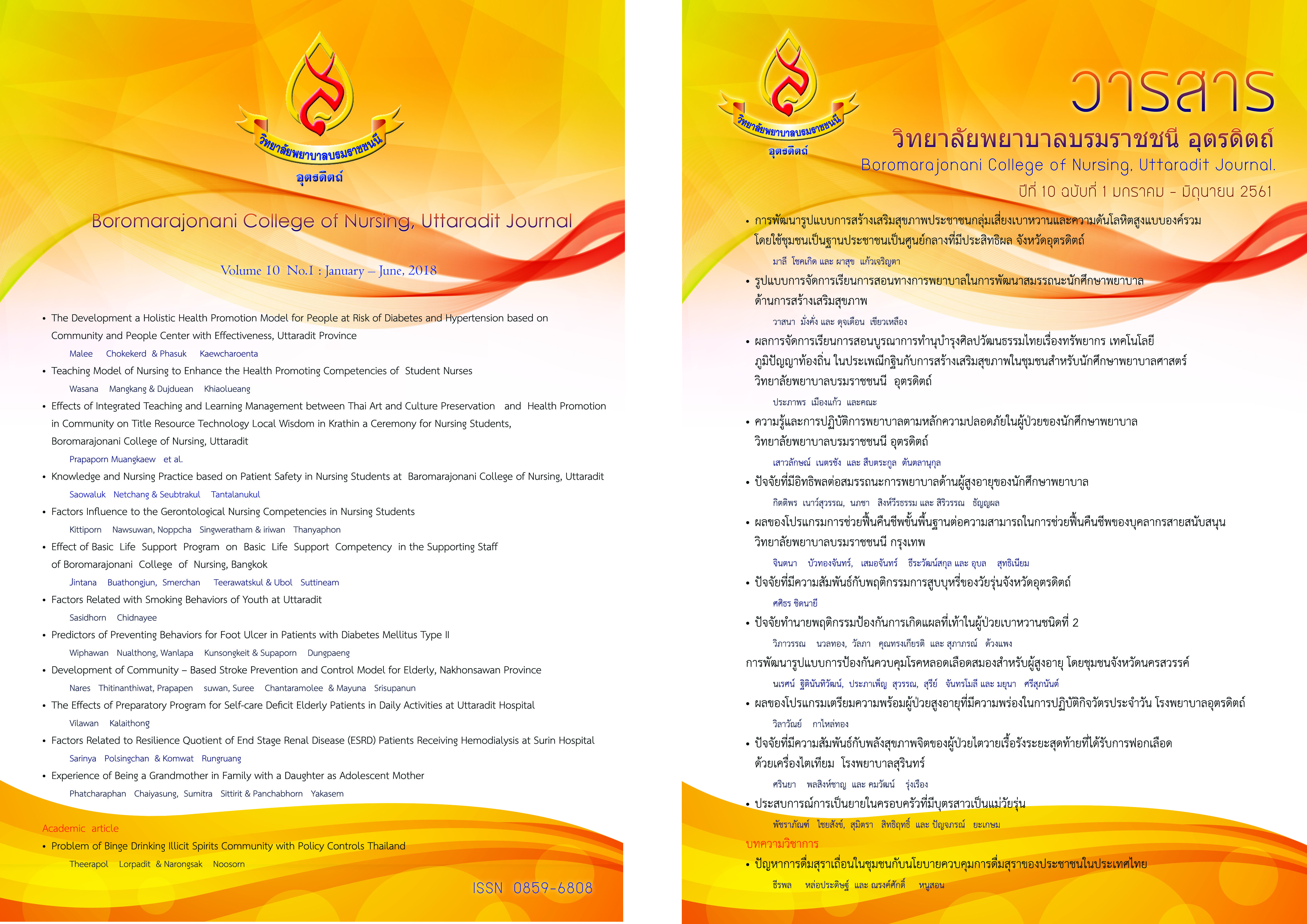ปัญหาการดื่มสุราเถื่อนในชุมชนกับนโยบายควบคุมการดื่มสุราของประชาชนในประเทศไทย
Main Article Content
บทคัดย่อ
การดำเนินนโยบายการเปิดเสรีการผลิตและจำหน่ายสุราส่งผลให้ประเทศไทยมีสถิติการดื่มสุราเป็นอันดับ 5 ของโลก และอัตราการดื่มสุรายังคงเพิ่มขึ้นอย่างต่อเนื่อง รัฐบาลจึงได้ออกนโยบายในการควบคุมการดื่มสุรามาโดยตลอดระยะเวลา 10 ปีที่ผ่านมา ซึ่งนโยบายต่างๆที่รัฐบาลกำหนดขึ้นมานั้นล้วนแต่เป็นการดำเนินโนบายที่นานาประเทศต่างได้นำมาจากข้อเสนอแนะขององค์การอนามัยโลก โดยการนำนโยบายที่สำคัญที่ยังดำเนินการถึงปัจจุบัน คือ การเพิ่มภาษีสุรา รวมทั้งการกวาดล้างสุราเถื่อน ซึ่งเชื่อว่าจะทำให้อัตราการดื่มสุราของประชาชนในประเทศลดลง แต่สิ่งที่เกิดขึ้นจากการดำเนินนโยบายดังกล่าวนั้นกลับสวนทางจากความเป็นจริงที่เกิดขึ้น คือ อัตราการดื่มสุรายังคงเพิ่มขึ้นอย่างต่อเนื่องโดยเฉพาะอย่างยิ่งการเพิ่มขึ้นของจำนวนนักดื่มในกลุ่มผู้มีรายได้น้อยและกลุ่มวัยแรงงานที่นิยมสุราเถื่อนชุมชน ทำให้เห็นได้ว่าการดำเนินการของนโยบายดังกล่าวยังมีจุดบกพร่อง ซึ่งผลกระทบที่ตามคือรัฐบาลขาดรายได้จากการเก็บภาษีสุรา แต่สิ่งที่น่าเป็นห่วงกว่านั้นคือ รัฐบาลต้องเสียงบประมาณในการพัฒนาประเทศมาดูแลผู้ป่วยที่มีผลมาจากการดื่มสุราเถื่อน เช่น ภาวะเป็นพิษจากเมทิลแอลกอฮอล์ซึ่งจะพบในสุราเถื่อน ทำให้เกิดการเจ็บป่วยเรื้อรังและการเสียชีวิตก่อนวัยอันควรเนื่องจากสุราเถื่อนนั้นมีการปนเปื้อนสารเคมีที่เป็นอันตรายที่ร่างกายเป็นจำนวนมากจากกระบวนการผลิตที่ผู้ผลิตมีความเชื่อที่ผิด
Article Details
บทความหรือข้อคิดเห็นใดใดที่ปรากฏในวารสารวิจัยการพยาบาลและวิทยาศาสตร์สุขภาพ เป็นวรรณกรรมของผู้เขียน ซึ่งบรรณาธิการหรือสมาคมศิษย์เก่า ไม่จำเป็นต้องเห็นด้วย และบทความที่ได้รับการตีพิมพ์เผยแพร่ถือเป็นลิขสิทธิ์ของวารสารวิจัยการพยาบาลและวิทยาศาสตร์สุขภาพ
เอกสารอ้างอิง
2. Bunnak. A., (2017). Handout common worm environmental pathology. clinical toxicology section. Uttaradit Hospital.9.
3. Bunlur. A ., (2017, August 11). Excise tax increase Liquor prices-up smoking Reduce consumption really. Retrieved from https://thestandard.co/increase-alcohol-cigarette-tax/ (in Thai)
4. Chaipipart. T., (2007). “Local Liquor” Reflection of self – learning process, adaption and new relationship under the change condition of government policy context a case study: of Ban Huey Mai village, Huey Mai sub – district, Phae Province. (in Thai)
5. Chaisong. S., Pakdeesedtakul. K., & Dhammarungsi. T., (2013). The proportion of alcoholic drinkers outside the tax system. Report consumption of alcoholic beverages by province. Provincial Alcohol Report 2011. Bangkok. The Grafico Systems Co., Ltd. 119/138 Moo 11, The Terrace, Tiwanon.,TaladKhwan. Nonthaburi. Nonthaburi 11000. 18. (in Thai)
6. Dirk W . Lachenmeier, et.al, (2012, August). Clinical toxicology. Carafate analytics, Journal Citation Reports 4 October 2011. 154-155.
7. Health Information System Development Office. (2017, August 12). Alcohol addiction is not illegal. Retrieved From www.hiso.or.th/hiso/tonkit/tonkits.
8. International Alliance for Responsible Drinking. (2016). Policy review unrecorded alcohol. 1 – 9. Lekfurngfu. N., et al., (2015). Alcohol consumption is illegal. "Liquor | Truth" Report on alcohol consumption in Thailand society in 2015. Center for Alcohol Studies. Bangkok. Durntular. 167 – 170.
9. Leeyatikul. P., (2017, August 12). The economic loss of liquor (Economic cost of alcohol). Retrieved From www.hiso.or.th/hiso/tonkit/tonkits. (in Thai)
10. National Statistical Office.(2014). Summary for survey executives smoking and habits drinking behavior of the population, 2014. 3. (in Thai)
11. Ramathibodi Poison Center, (2015, December). Methanol toxicity. Faculty of Medicine, Ramathibodi Hospital, Mahidol University. Retrieved From https://med.mahidol.ac.th/ (in Thai)
12. Research Institute for health sciences, Chiang Mai University, (2015). The situation of alcohol distillation community in Phayao. January 31, 2014.
13. Sangow. U., Wijittrakunakhon. P., & Aschanangkhonchai. S., (2016). Facts and figures: Alcoholic beverages in Thailand. Center for Alcohol Studies. Bangkok. 1 – 4. (in Thai)
14. Sitdhiraksa. N. et al., (2012). Study of quality of life in alcohol dependent patients at Siriraj and Sritanya Hospitals. J Psychiatr Assoc Thailand 2012; 57(2): 185-198
15. Spirits Europe, (2017,). High Tax, incentive For illicit alcohol. Retrieved August 11, 2017 From https://spirits.eu/taxationeconomy/high-tax-incentive-for-illicit-alcohol
16. Sujinprum. W. & Wised. S., (2016). Bangkok. October prints. Center for Alcohol Studies. Bangkok. 11-12. (in Thai)
17. Yadong. P, (2015.). August 11, 2017. from https://surathai.wordpress.com/2015/11/28/illegal-alcohol/. (in Thai)
18. Upkum. N., et al., (2010). The lessons learned The format for the care and prevention of alcohol in the community.(2 nd ed.). Cheangmai. Wanida.
19. Wiriyahirunpibun. J.,(1994). Illicit Alcohol. Toxicology Center Department of Medical Sciences Ministry of Public Health. Retrieved November 6, 2017 , from https://webdb.dmsc.moph.go.th
20. World Health Organization (WHO), (2014). Unrecorded alcohol consumption , unrecorded alcohol. Global status report on alcohol and health – 2014. 30-31.
21. Yanuch. Y., & Yodkamansad. S., (2016). Woman with local alcohol communities saeab. Bangkok. 28 – 29. (in Thai)


